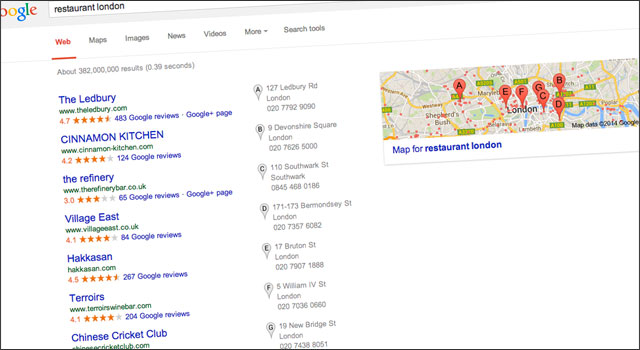For many small businesses, a significant number of customers come from their local area. A 2011 study by Search Engine Land showed that 59% of US consumers used Google to search for local businesses. A report from Burke (again US focused — UK specific data is not always easy to come by, unfortunately) showed that 76% of people looking for local businesses had searched online at least once during 2010. Whilst these figures are US-centric, there is good reason to think UK data would show similar numbers.

Mobile has also had a huge effect on local search, as many users search for products and services in the immediate vicinity whilst on the move. With eMarketer forecasting that 53.7% of the British population will have a smartphone by next year, and that figure expected to rise to over 65% by 2017, the importance of mobile local search is only going to grow.
So, how do you ensure that you are taking advantage of local and mobile local search?
Get noticed in local and mobile search
Well one way is to make sure you have a Google+ Local (formerly Google Places) page. A Google+ Local page is a local business listing that is linked into Google search and Google maps. The listing includes basic information about your business, such as your physical location, phone number, website, hours of operation, and services available, but also includes posts, photos and videos. In addition, people can contribute reviews.
How to get a Google+ Local Page
If you have a physical location, you may already have a listing and not even know it. A simple Google search for your company name may reveal it. If your company is listed you should see a page similar to that shown in the image below, with the name of your company and website on the left and a Google map marker icon with address below. On the right will be a map and some other details.

Alternatively, searching in Google Maps may reveal something like this…

If you have a listing, click on it and you will be given the option of claiming the page. Once claimed, you will be given an option to create a Google+ Local page.
If you don’t see something like the above, then you probably don’t have a Google+ Local page yet. To set one up simply visit this link and follow the steps — you’ll need a Google email address (Gmail, or GoogleApps) to link the account to. The process is not particularly long or complicated, but will take a longer email than this to go through. You can read instructions on setting up your page here, and this article from Search Engine Watch may also be useful.

Once you’ve got your page setup, you need to start populating it with information. Along with details about your opening times, services, and products, your Google+ Local page will have many of the features of a regular Google+ page. You can add photos and videos of your products, or work you have produced — adding a location to each photo and video you upload may offer some further benefit to your local search results. You can also write posts (like updates on Facebook).
Google Reviews
A key element of Google+ Local pages is reviews, and they will sometimes appear below your listing in Google search results (like the image below). Whether reviews appear will depend on the search terms the user enters.
Good reviews or testimonials are the modern-day equivalent of good word of mouth, so you want your satisfied customers and clients to review and rate your business on your Google+ Local page.

Buying reviews, or offering incentives is not permitted (you wouldn’t want to go the way of the fake Yelp reviewers of New York), but there is one way you can improve your chances for good reviews without incurring the wrath of the Google Gods — write some for other businesses.
Show your appreciation for your fellow local businesspeople through positive reviews, and you might encourage them to do the same for you. Keep it truthful, and only review products or services that you have experienced. It’s probably wise to refrain from harsh criticism — as the saying goes, if you can’t say anything nice, don’t say anything at all.
If it is not possible to leave a review on your page it is because you still have to verify your page. You can learn how to do that here.
Multiple Google+ Pages
It may be that you already have a Google+ Page for your business, but now wish to take advantage of the local features. Unfortunately, unless you created your existing Google+ Page as a “Local Business or Place”, there is no way to merge it with a Google+ Local page. You will have to create a separate page. (However, if your existing G+ page is a Local Business you can merge it.) It can be frustrating to have to maintain two pages (we have to), but there are some ways to address it.
Firstly, put different types of content on each. Google+ expert Andrew Huskinson suggests that a Google+ Local page be kept for posting content for local followers (such as offers, promotions, or events), and a general Google+ company page be used for networking content. Different imagery could also be used, and different levels of detail on locality. For example, on our main Google+ Page we have tagged our images and video with the location London. Whereas on our Google+ Local page they are tagged with the exact street address of our office.
This is just a snapshot of what Google+ Local can offer, so if you haven’t already done so, check it out. To learn more visit this page or here.


